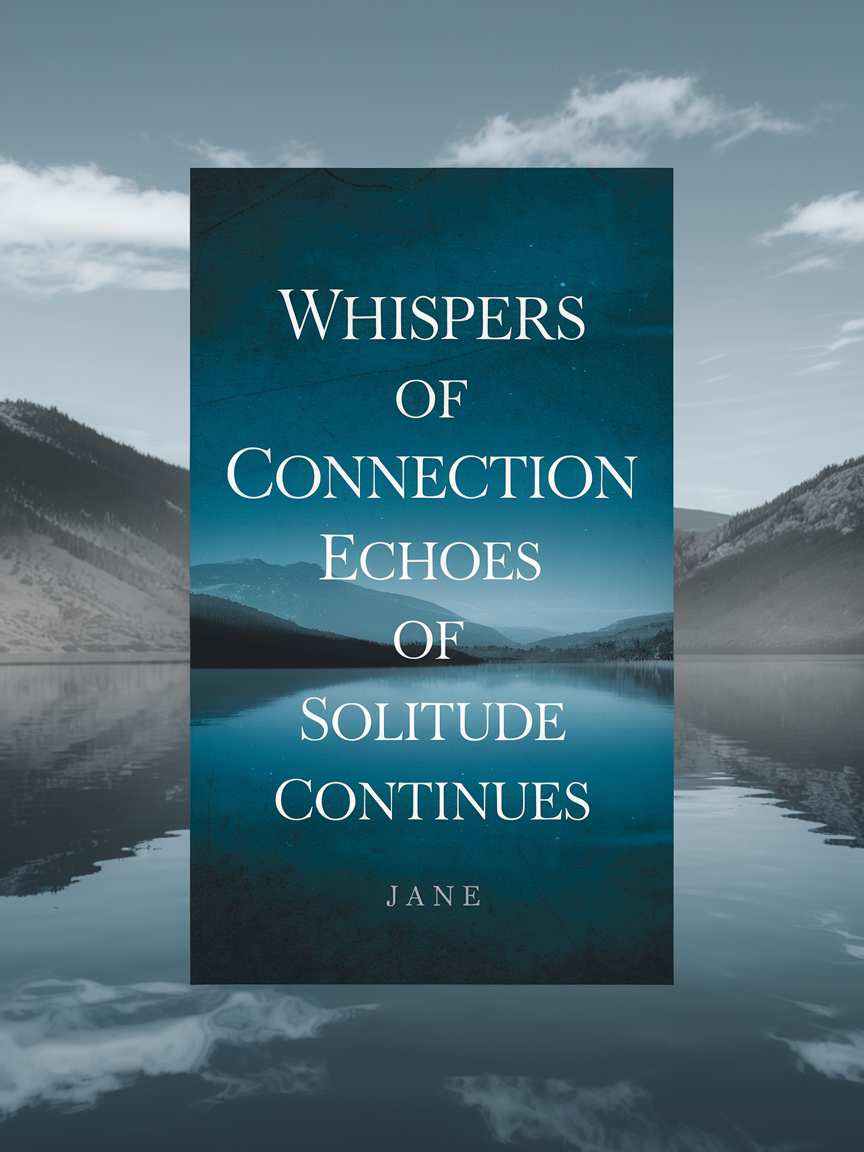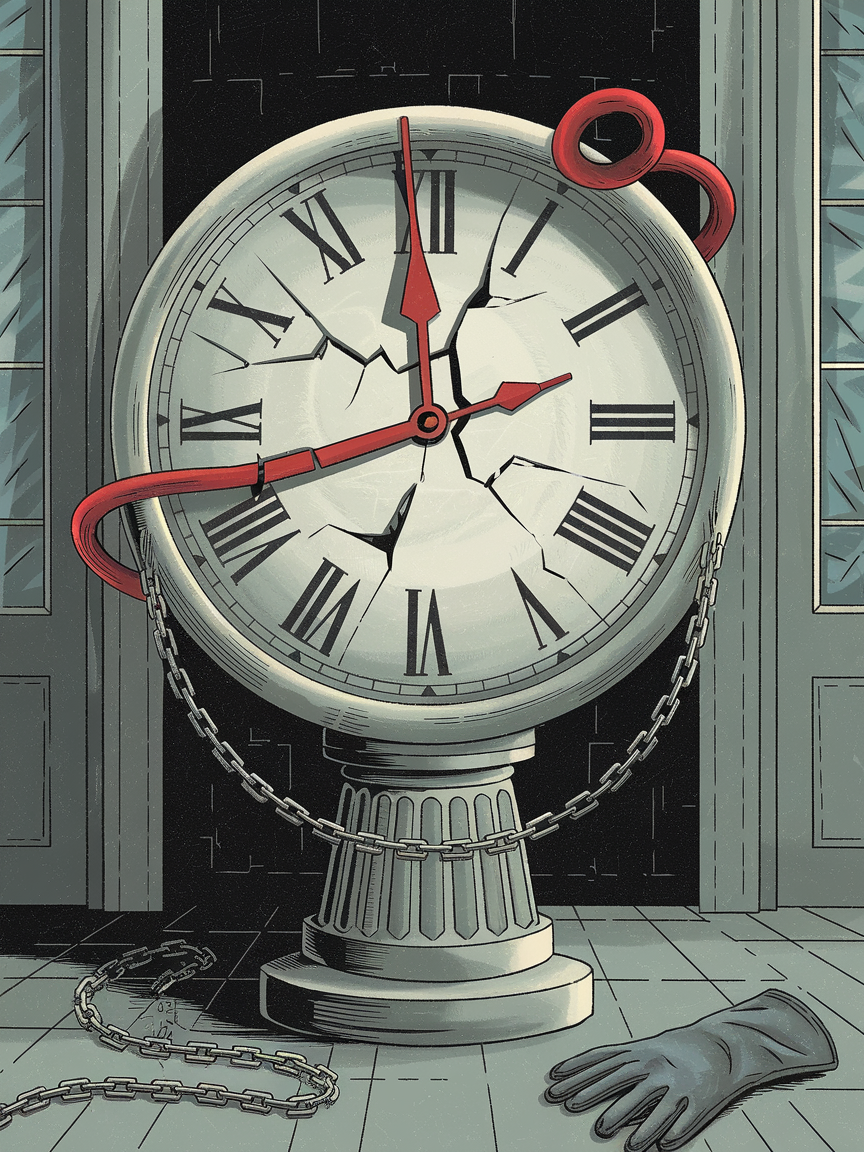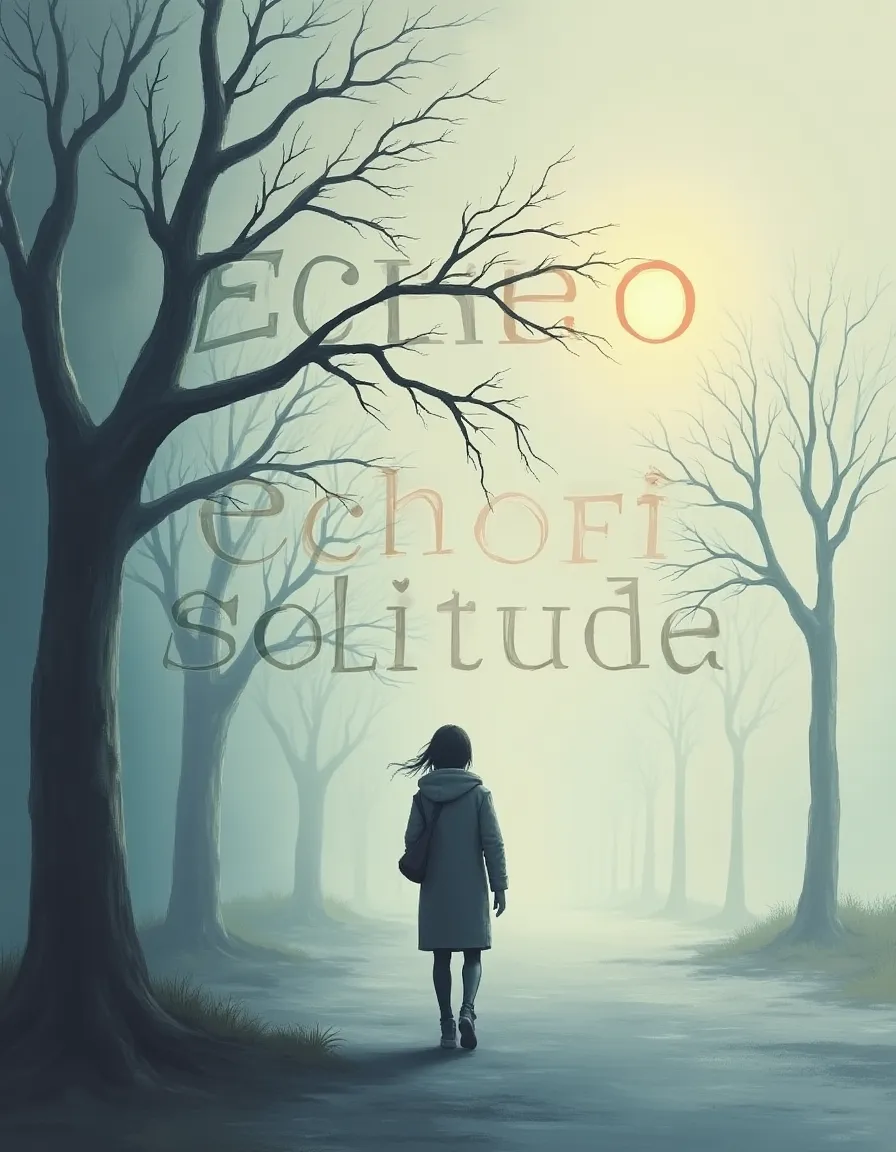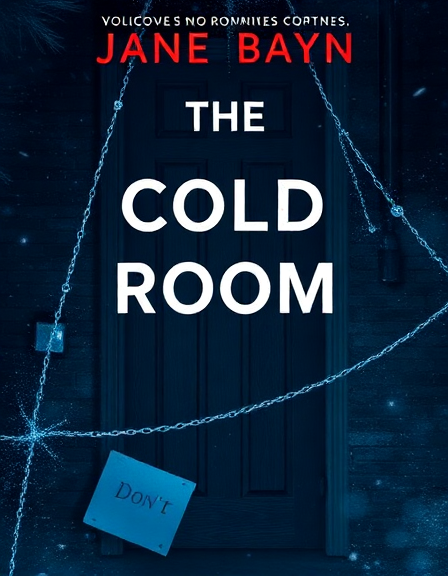This sequel to "Echoes of Solitude" felt like a gentle continuation of a familiar feeling.
I appreciated seeing the student start to open up a little more, even in small ways.
The minimalist prose Jane uses still creates that reflective, quiet atmosphere.
It was interesting to explore how even introverted moments are touched by others.
I did find myself wishing for a bit more overt interaction to drive the narrative forward.
Some of the shared silences felt a little too prolonged for my taste.
The focus on subtle connections was certainly present, though.
It's a book that encourages reflection, but maybe a bit too much quiet for me personally.
For those who loved the first book's introspective nature, this offers a natural next step.
It’s a thoughtful read, but perhaps not one that will grab everyone.
Whispers of Connection continues the contemplative journey effectively, though with some unevenness.
The exploration of burgeoning connections felt somewhat understated, mirroring the previous book's quietude perhaps too closely.
Jane's minimalist prose remains a defining feature, allowing space for subtle emotional shifts to resonate.
The student's internal landscape is again rendered with sensitivity, but the external interactions lacked a stronger narrative pull.
While the theme of finding community in quiet moments is a valuable insight, the progression felt a little slow.
Readers who cherished the introspection of "Echoes of Solitude" will find a familiar and gentle continuation here.
The balance between internal reflection and external interaction is a delicate dance, and this installment leans more on the former.
It's a book that rewards patience and a keen eye for subtle shifts in perspective.
The emotional engagement remained consistent with the previous volume, offering a sense of quiet recognition.
Ultimately, it's a solid continuation that expands the series' core themes without drastically altering its established tone.
Jane has masterfully continued the introspective journey from "Echoes of Solitude."
The narrative's exploration of tentative connections felt beautifully understated.
I appreciated how the minimalist prose still conveyed so much emotional nuance.
The student's evolution, even in small interactions, was thoughtfully depicted.
It's a profound reminder that even solitude is intertwined with the presence of others.
The quiet moments of shared experience resonated deeply with me.
While I enjoyed the progression, I sometimes wished for a slightly more explicit exploration of the burgeoning friendships.
Overall, this sequel is a gentle yet significant expansion of the series' themes.
It’s a book that truly speaks to the subtle ways we connect with the world around us.
I wholeheartedly recommend this to anyone who appreciated the quiet beauty of the first installment.
Chronos Echo offered an interesting premise but didn't quite hit all the marks for me.
The idea of a repeating day was compelling, but the execution sometimes felt a bit repetitive itself, mirroring the protagonist's situation.
Aris's struggle with existential dread was well-portrayed, though some of the secondary characters like Lena could have used more development.
The writing was generally clear, though I found myself wanting more emotional depth in certain moments.
I appreciated the exploration of free will versus determinism, it definitely made me think.
Captain Rostova's subtle shifts were intriguing and added a layer to the regime's portrayal.
The pacing could be a bit uneven at times, with certain sections dragging slightly.
Ultimately, it’s a solid science fiction read that tackles big ideas, but it left me wishing for a bit more punch.
I'd recommend it to those who enjoy philosophical sci-fi and don't mind a slower burn.
It made me ponder the weight of our choices, even when they feel inconsequential.
The concept of being trapped in time is fascinating, and Jane explored that well.
It was a good read for a casual afternoon, offering plenty to chew on.
Chronos Echo offers a compelling, thought-provoking dive into a reality-bending temporal prison.
The central conceit of a repeating day is handled with an admirable, if occasionally disorienting, precision that drives the narrative forward.
Dr. Aris Thorne's descent into existential dread feels visceral, though some secondary characters could have benefited from more distinct development beyond their plot functions.
Jane's prose is clean and efficient, maintaining a consistent tone that supports the story's psychological weight.
The exploration of free will versus determinism, particularly through Aris's evolving understanding of his predicament, is a significant strength.
While the resolution feels earned, a few plot threads could have been tied up more explicitly for complete closure.
The nascent connection between Aris and Lena Petrova provides a welcome emotional anchor amidst the repeating despair.
Security Chief Kaelen serves as an effective foil, embodying the oppressive system with a chilling sense of duty.
Captain Rostova's subtle internal shifts hint at a more complex regime than initially presented.
The novel's exploration of the corrupting nature of power is particularly resonant given the temporal loop's implications.
Overall, Chronos Echo is a well-crafted science fiction tale that lingers in the mind long after the final page.
I appreciated the intricate plotting and the philosophical questions it raises about consequence and agency.
Chronos Echo is a compelling science fiction novel that truly engrossed me.
The central premise of a repeating day on Chronos Station is executed with a palpable sense of dread and intellectual rigor.
Dr. Aris Thorne's descent into existential despair feels authentic, making his struggle to escape the loop incredibly engaging.
Jane skillfully weaves complex themes of free will, determinism, and the corrupting influence of absolute power throughout the narrative.
The exploration of the psychological toll of temporal imprisonment is a significant strength of the book.
I particularly appreciated the nuanced development of Security Chief Kaelen, whose role as an antagonist is complex.
The budding relationship between Aris and Lena Petrova offers a much-needed human element amidst the scientific and philosophical quandaries.
Captain Rostova's subtle shifts in perspective add layers to the regime's portrayal.
While the pacing occasionally felt deliberate, it effectively amplified the oppressive atmosphere of the time loop.
The ending provided a satisfying, albeit thought-provoking, resolution to Aris's predicament.
I would recommend Chronos Echo to readers who enjoy philosophical science fiction with a strong character focus.
It’s a story that lingers long after you’ve turned the final page.
The Unseen Patterns is a solid introduction to data science, though it felt a bit dry for my usual reading habits.
It covers the core methodologies well, from data cleaning to predictive modeling, but sometimes felt more like a textbook than a story.
The minimalist aesthetic is present, and while it helps focus on the concepts, it didn't really draw me in emotionally.
I appreciated learning about the ethical considerations, which is a really important part of data science today.
It definitely equipped me with foundational knowledge and a better understanding of how data can shape our world.
For aspiring data scientists who enjoy a more academic approach, this book is a good starting point.
The Unseen Patterns offers a solid introduction to data science fundamentals, though its approach feels a touch dry at times.
The progression through data acquisition to predictive modeling is logical, but some examples could benefit from more depth.
Jane's writing is clear and precise, maintaining an academic tone suitable for the subject matter.
The book effectively outlines the key statistical and algorithmic concepts, but the ethical considerations felt somewhat brief.
I appreciated the structured approach to learning, and the minimalist aesthetic did help maintain focus on the core material.
Aspiring data scientists will find a good foundation here, provided they are prepared for a straightforward presentation.
While the book imparts valuable knowledge, the emotional or narrative engagement is understandably minimal in a primer of this nature.
The pacing is steady, but the lack of varied illustrative scenarios might hinder deeper comprehension for some learners.
Character development isn't a focus here, as the book centers on abstract concepts and methodologies.
The writing quality is competent, prioritizing accuracy and clarity over stylistic flourish.
Overall satisfaction is moderate; it serves its purpose as a primer but doesn't particularly excel in making the subject captivating.
"The Unseen Patterns" is a truly wonderful introduction to data science for anyone looking to understand its core principles.
Jane has managed to demystify complex topics like data acquisition, cleaning, and predictive modeling with remarkable clarity.
The book strikes a great balance between intellectual rigor and accessibility, making it a pleasure to read.
I particularly appreciated the emphasis on ethical considerations, which is so crucial in today's data-driven world.
The minimalist aesthetic and carefully curated examples enhance the learning experience significantly.
It equipped me with a much deeper understanding of how to uncover hidden truths within data.
I would enthusiastically recommend this book to any aspiring data scientist or anyone curious about the field.
This primer has genuinely changed how I view the information around me.
Echoes of Solitude felt like a really honest look into student life, which I appreciated.
The diary entries were simple, showing the everyday grind rather than a big plot.
It captured that feeling of being a bit alone with your thoughts during busy academic periods.
Jane's writing style is very minimalist, focusing on small moments and quiet anxieties.
I connected with the subtle portrayal of growth and searching for meaning in routine.
It was a quiet read, but it made me think about those unspoken parts of being a student.
While there wasn't a lot of dramatic action, the introspection was quite compelling.
Some entries felt a little repetitive, but overall it was a thoughtful experience.
I'd recommend this to anyone who likes reflective, personal narratives.
It's a good choice for a quiet afternoon read when you want something relatable.
Echoes of Solitude is a remarkably profound and moving exploration of the student experience.
The book’s strength lies in its unvarnished depiction of daily academic life and the internal landscape of a young person.
Jane's writing style is stark and minimalist, effectively conveying the quietude and introspection of the subject matter.
The diary format lends an authentic voice to the narrator's subtle growth and search for meaning.
While the lack of a conventional plot might deter some, the emotional depth achieved through observation is truly impactful.
The narrative is a testament to the power of quiet observation and the significance of personal journeys.
I appreciated the focus on the unspoken anxieties and the understated shifts in perspective.
This is a book that resonates with anyone who has navigated the solitary path of learning and self-discovery.
It offers a unique and deeply felt perspective on a familiar yet often overlooked aspect of life.
I highly recommend Echoes of Solitude to readers who appreciate thoughtful, introspective narratives.
The book succeeds in capturing the essence of solitary growth with remarkable honesty.
It is a quiet triumph, offering a valuable glimpse into the interior world of a developing mind.
Echoes of Solitude truly captured the essence of the student experience with its unvarnished honesty.
The diary entries, while depicting the quiet routines of academic life, offered a profound look at internal growth.
Jane's writing is beautifully stark, allowing the weight of the unspoken to truly resonate.
The exploration of solitude and the search for meaning amidst daily life felt incredibly authentic.
I found myself deeply connected to the introspective journey and the subtle shifts within the narrative.
The minimalist approach to storytelling allowed for immense depth, making each entry significant.
It’s a powerful reminder of the enduring importance of personal narratives.
This book is a must-read for anyone who appreciates introspection and the beauty of simplicity.
The pacing felt natural, mirroring the slow unfolding of self-discovery.
I was thoroughly engaged by the raw emotional honesty presented throughout the diary.
This is a deeply satisfying read that lingers long after the final page.
I highly recommend this book to fellow readers who seek meaning in the quiet moments.





